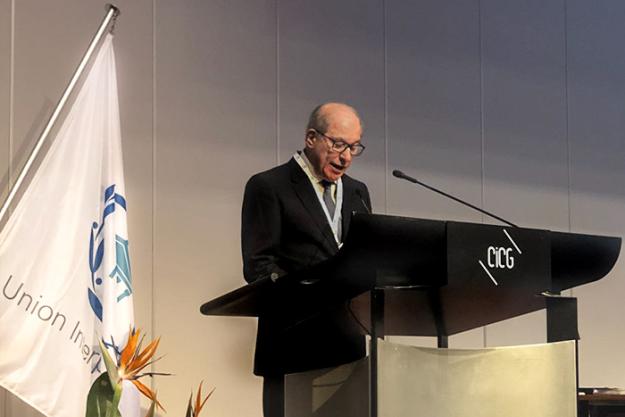
The Director-General of the OPCW addressing the Inter-Parliamentary Union’s Assembly
THE HAGUE, Netherlands — 28 March 2018 — The Director-General of the Organisation for the Prohibition of Chemical Weapons (OPCW), Ambassador Ahmet Üzümcü, met with Inter-Parliamentary Union’s (IPU) President, Ms Gabriela Cuevas Barron, as well as IPU’s Secretary-General, Mr Martin Chungong, during a visit to Geneva on 27 March where he also addressed the Inter-Parliamentary Union’s Assembly.
During separate meetings with IPU’s senior officials, the Director-General briefed them on the progress and challenges related to the implementation of the Chemical Weapons Convention (CWC), including OPCW’s activities in the Syrian Arab Republic, and the Organisation’s efforts to counter the use of chemical weapons. He also discussed the recent incident of use of a chemical weapon in the United Kingdom.
In his speech at the IPU’s 138th Assembly, Ambassador Üzümcü underlined the important role of parliamentarians in enacting domestic legislation to enforce the Chemical Weapons Convention. He stated that “the full implementation of the CWC would be the most effective deterrence against proliferation” and “critical to … the ability of States Parties to prevent non-State actors from gaining access to materials that could aid in the development of chemical weapons.”
The Director-General also underscored how parliamentarians are “shapers of opinion in support of upholding and enforcing agreed norms” and encouraged them to continue sensitising the public opinion “about the state of our world and the concerted steps we can take to strengthen multilateral legal frameworks and institutions to meet global challenges effectively.
Background
The Inter-Parliamentary Union is composed of national parliaments from all around the world. With its 178 Member Parliaments and 12 Associate Members, IPU works to advance global democracy.
The IPU’s Assembly is its main political body vested with the power to adopt resolutions advancing the Union’s activities to address the issues that threaten peace, democracy, and development.
As the implementing body for the Chemical Weapons Convention, the OPCW oversees the global endeavour to permanently eliminate chemical weapons. Since the Convention’s entry into force in 1997 – with its 192 States Parties – it is the most successful disarmament treaty eliminating an entire class of weapons of mass destruction.
Over 96 per cent of all chemical weapon stockpiles declared by possessor States have been destroyed under OPCW verification. For its extensive efforts in eliminating chemical weapons, the OPCW received the 2013 Nobel Prize for Peace.
